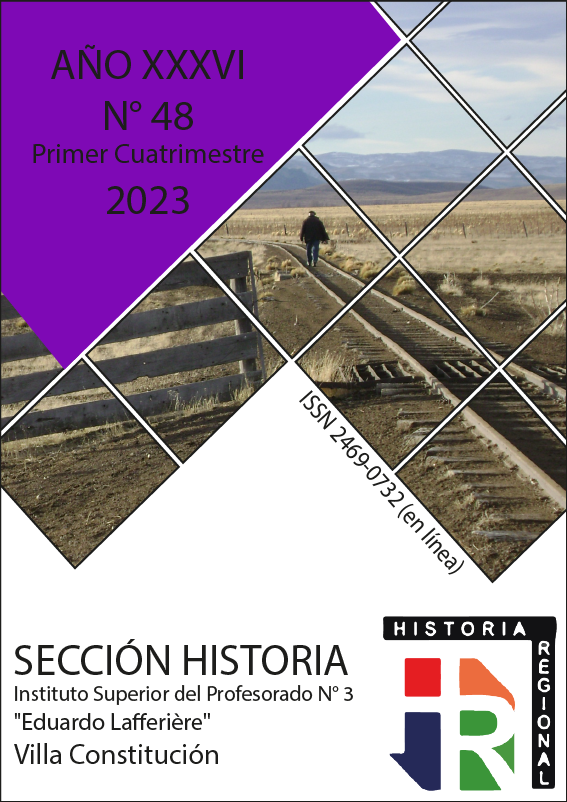Testimonies, orality and territory in Chubut, libertad y tierra (2019)
Main Article Content
Abstract
In this paper, we will analyse the documentary Chubut, libertad y tierra (2019), by the Patagonian filmmaker Carlos Echeverría, which addresses the issue of land in the hands of foreign landowners in the far south of the country. We will be interested in the staging of oral testimonies, especially the audio recordings of the main protagonist around whom the film revolves: the doctor Juan Carlos Espina, national deputy for the Unión Cívica Radical Intransigente and founder of the political party "Libertad y tierra", based in the city of El Maitén, in the province of Chubut. The analysis of the various archive images used in the film to reconstruct a very important and little-known part of the region's recent history will be another focus of this work. Finally, we will deal with the territorial, regional and spatial imaginary that the film stages. Testimonies, orality and territory are elaborated together to address subaltern memories, neglected by nationalist historiography, and to account for an imaginary linked to the past and present struggles of the native peoples.
Downloads
Download data is not yet available.
Article Details
How to Cite
de la Puente, M., & Díaz Quiroga, L. (2022). Testimonies, orality and territory in Chubut, libertad y tierra (2019). Historia Regional, (48), 1-9. Retrieved from https://historiaregional.org/ojs/index.php/historiaregional/article/view/682
Section
Dossier

This work is licensed under a Creative Commons Attribution 4.0 International License.
Los autores que publican en esta revista están de acuerdo con los siguientes términos:
- Los autores conservan los derechos de autor y garantizan a la revista el derecho de ser la primera publicación del trabajo al igual que licenciado bajo una Creative Commons Attribution License que permite a otros compartir el trabajo con un reconocimiento de la autoría del trabajo y la publicación inicial en esta revista.
- Los autores pueden establecer por separado acuerdos adicionales para la distribución no exclusiva de la versión de la obra publicada en la revista (por ejemplo, situarlo en un repositorio institucional o publicarlo en un libro), con un reconocimiento de su publicación inicial en esta revista.
- Se permite y se anima a los autores a difundir sus trabajos electrónicamente (por ejemplo, en repositorios institucionales o en su propio sitio web) antes y durante el proceso de envío, ya que puede dar lugar a intercambios productivos, así como a una citación más temprana y mayor de los trabajos publicados (Véase The Effect of Open Access) (en inglés).
References
Aprea, G. (2015). Documental, testimonios y memorias. Miradas sobre el pasado militante. Buenos Aires: Manantial.
Cano, N. y Pérez, P. (2019). Racismo, fijación y movilidad social en los parajes del oeste del Pichileufu. En L. Cañuqueo et al. (Ed.), La tierra de los otros. La dimensión territorial del genocidio indígena y sus efectos en el presente. Viedma: Editorial UNRN.
Caquard, S. y Taylor, F. (2009). What is Cinematic Cartography?. The Cartographic Journal 46 (1): 5-8, British Cartographic Society.
Depetris Chauvin, I. (2019). Geografías afectivas. Desplazamientos, prácticas espaciales y formas de estar juntos en el cine de Argentina, Chile y Brasil (2002-2017). Pittsburgh: Latin American Research Commons. Recuperado de https://www.larcommons.net/site/books/m/10.25154/book3/
De Certeau, M. (1999). La invención de lo cotidiano. I. Artes del hacer. México: Universidad Iberoamericana.
Dipaola, E. (2010). La producción imaginal de lo social. Trabajo presentado en las VI Jornadas de Sociología de la UNLP, Universidad Nacional de La Plata, Facultad de Humanidades y Ciencias de la Educación, Departamento de Sociología, La Plata. Resumen recuperado de http://sedici.unlp.edu.ar/handle/10915/106669
Fisher, M. (2021). K-Punk- Volumen 3. Escritos reunidos e inéditos (Reflexiones, Comunismo ácido y entrevistas). Buenos Aires: Caja Negra.
Harvey, D. (1990). Between Space and Time: Reflections on the Geographical Imagination. Annals of the Association of Geographers 80: 418-34.
Jelin, E. (2002). Los trabajos de la memoria. Madrid/Buenos Aires: Siglo XXI.
Minieri, R. (2006). Ese ajeno sur. Viedma: Fondo Editorial Rionegrino.
Ricoeur, P. (2004). La memoria, la historia y el olvido. Buenos Aires: Fondo de Cultura Económica.
Cano, N. y Pérez, P. (2019). Racismo, fijación y movilidad social en los parajes del oeste del Pichileufu. En L. Cañuqueo et al. (Ed.), La tierra de los otros. La dimensión territorial del genocidio indígena y sus efectos en el presente. Viedma: Editorial UNRN.
Caquard, S. y Taylor, F. (2009). What is Cinematic Cartography?. The Cartographic Journal 46 (1): 5-8, British Cartographic Society.
Depetris Chauvin, I. (2019). Geografías afectivas. Desplazamientos, prácticas espaciales y formas de estar juntos en el cine de Argentina, Chile y Brasil (2002-2017). Pittsburgh: Latin American Research Commons. Recuperado de https://www.larcommons.net/site/books/m/10.25154/book3/
De Certeau, M. (1999). La invención de lo cotidiano. I. Artes del hacer. México: Universidad Iberoamericana.
Dipaola, E. (2010). La producción imaginal de lo social. Trabajo presentado en las VI Jornadas de Sociología de la UNLP, Universidad Nacional de La Plata, Facultad de Humanidades y Ciencias de la Educación, Departamento de Sociología, La Plata. Resumen recuperado de http://sedici.unlp.edu.ar/handle/10915/106669
Fisher, M. (2021). K-Punk- Volumen 3. Escritos reunidos e inéditos (Reflexiones, Comunismo ácido y entrevistas). Buenos Aires: Caja Negra.
Harvey, D. (1990). Between Space and Time: Reflections on the Geographical Imagination. Annals of the Association of Geographers 80: 418-34.
Jelin, E. (2002). Los trabajos de la memoria. Madrid/Buenos Aires: Siglo XXI.
Minieri, R. (2006). Ese ajeno sur. Viedma: Fondo Editorial Rionegrino.
Ricoeur, P. (2004). La memoria, la historia y el olvido. Buenos Aires: Fondo de Cultura Económica.

